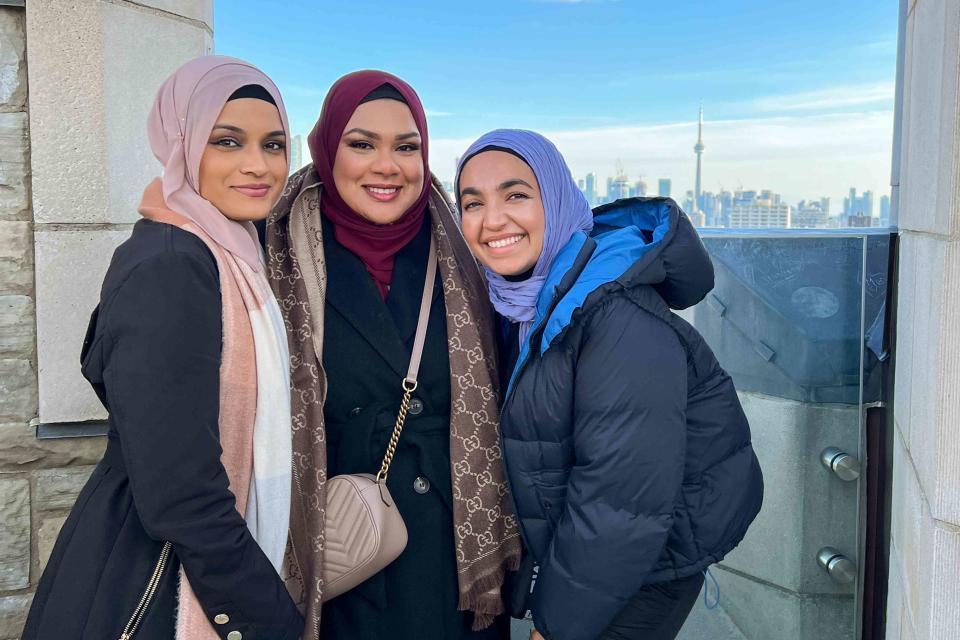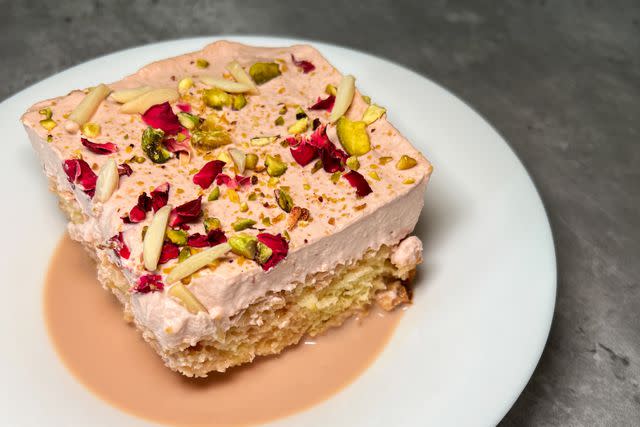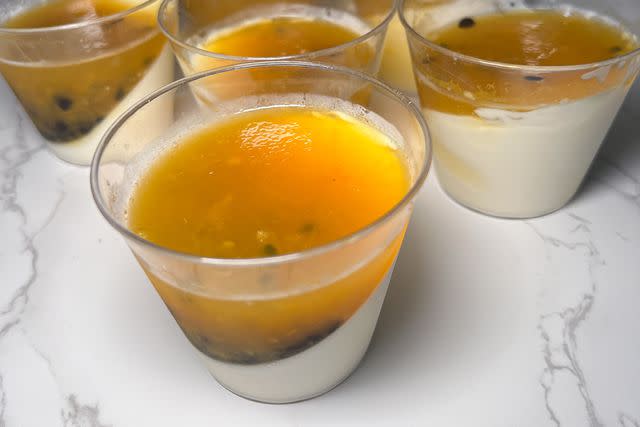The Founders of MuslimFoodies Share the Eid Foods That Taste Like Home
The influencers who share halal eateries in New York City celebrate breaking the Ramadan fasting with traditional foods from Bangladesh, Guyana, and Pakistan.

As Ramadan ends, Muslims worldwide prepare for Eid al-Fitr, a celebration marking the conclusion of a month dedicated to fasting, prayer, reflection, and charity. For Tahirah Baksh, Sameen Choudhry, and Jiniya Azad, the faithful and food-infatuated founders of the popular Instagram account and blog MuslimFoodies, waking up on Eid morning is not only spiritually reinvigorating but culturally rewarding. Eid is a day that reminds them of their families' origins, their traditions, and, perhaps most importantly, some of their favorite home-cooked foods.
Baksh, Choudhry, and Azad met in college and after connecting over their love of food, launched a blog. “It was the Instagram era where everyone would post without thinking. No aesthetic feed, no curation, nothing. It was just food,” Azad recalls. What started as three friends wanting to find halal spots they could enjoy after class has become an Instagram destination for Muslims and food lovers with more than 100,000 followers.
For Eid, however, the three emphasize the importance of traditional foods that may not always make it to their Instagram — the dishes that their elders have prepared for generations to mark this occasion. While they share common rituals — such as the post-prayer “Eid nap” following the festive breakfast — they note the diverse culinary heritage within the Muslim community. They speak of the significance of incorporating family recipes from their respective countries of origin, highlighting the rich tapestry of flavors and customs that make their Eid celebrations meaningful. This diversity underscores the fact that the Muslim world is not a monolith, but a mosaic of cultures, traditions, and experiences.
Related: 25 Recipes to Celebrate Eid al-Fitr
Baksh, a born-and-raised New Yorker from the Bronx whose family is from Guyana, views Ramadan as a blessing, calling it a “month of mercy and forgiveness.” Growing up in a primarily Muslim neighborhood, she says Eid has always been a day full of community, celebration, and a deep love of sharing with others. “All day, there are people coming and going and eating a little something at our house.” The Guyanese staples at her family’s table include a spicy duck curry seasoned in Caribbean and West Indian flavors such as green seasoning, masala, and wiri wiri pepper. They cook the spices in oil to bring out their flavor, then coat the duck in the oil and spice paste, allowing the spices to season the duck. Served alongside this spicy dish is a sweet and milky vermicelli that bridges the savory and sweet on the table.

Choudhry’s family also serves a combination of sweet and savory dishes for Eid. “We have it all at breakfast; this is our biggest meal and has stayed consistent over the years,” she says. A New Yorker raised in Queens but born in Pakistan, Choudhry says her family’s table is covered in traditional Pakistani breakfast entrees including halwa puri, a sweet dish made with semolina (also known as sooji ka halwa) and a deep-fried flatbread. Her family also serves cholay ka salan, a chickpea curry next to aloo ki tarkari, a potato curry that’s tangy and spicy seasoned with mustard seeds and pickled spices and often topped with freshly cut red onions. Choudhry’s grandmother oversees her family’s Eid meal and makes a traditional rice pudding dish called kheer that she mixes with vermicelli to make her own. “We’re so excited for [this dish], this is mine and my cousins’ primary memory; Eid is the day our grandma is going to make this dish,” she says. “It’s such a simple food, but for us, it means a lot.”
Azad, born in the seaport city of Chittagong in Bangladesh but raised in Brooklyn and Queens, spoke of her mother’s chotpoti — a slowly cooked white pea and chickpea stew. “I know Eid is here when I can smell my mom’s chotpoti stew cooking the night before,” she says. Her family personalizes their chotpoti with toppings like cilantro, boiled eggs, and fuchka (a deep-fried dough that “pops” when Azad crushes them over her bowl). Azad’s favorite topping is her mother’s thick homemade tamarind sauce, “I love that kick of sourness in my chotpoti bowl,” she says. Some Eid breakfasts feature her mother’s haleem, a spicy stew that’s made with beef, goat, or chicken cooked with barley and lentils and garnished with fried onions, cilantro, and some lemon juice for an added tang. “Bengalis make it much thicker and reduce it down more which creates this concentrated flavor that can only be achieved by the long cooking time,” she says.

“Food in particular is what brings the community together… food has always been our love language. So to see your friend, your brother, at the mosque and invite them over to share in the Eid celebration is very special,” says Baksh. Since food is central to each of the MuslimFoodies’ days, the holy month of Ramadan can feel long — 12 to 14 hours of fasting during the day can make any afternoon drag on. They note that Ramadan’s blessings are grounded in charity and solidarity most of all. It’s a month dedicated to taking care of those who are less fortunate, and this Eid feels different. “We are heartbroken,” shares Azad. “Many of us are feeling anguish and extreme sorrow for what is going on in different parts of our Muslim community. While we have the privilege to safely break fasts with our families, we remember the people of Gaza, whose Eid will look starkly different than ours.”
By the time Eid comes around, they welcome the anticipation of the joyous day that comes faster than they expect every year. “I always think of that analogy…Ramadan is your life,” says Jiniya. “Getting into heaven is Eid basically…it’s a very, very small taste of what paradise is like. You’re fasting for 30 days, you’re abstaining from a lot of things in the daytime…Eid is a glimmer of what’s to come.”
For more Food & Wine news, make sure to sign up for our newsletter!
Read the original article on Food & Wine.


